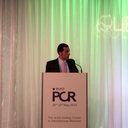Effects of a new nutraceutical ingredient on allergen-induced sulphidoleukotrienes production and CD63 expression in allergic subjects.
Schlüsselwörter
Abstrakt
Allergic diseases represent conditions affecting millions of individuals across the world. The objective of this study was to investigate the potential anti-allergic effects of a new nutraceutical ingredient, Pantescal (Bionap, Italy), contained in different food supplements. Pantescal is a mixture of plant extracts, such as Capparis spinosa, Olea europaea, Panax Ginseng and Ribes nigrum. The study was a randomized, double-blind, placebo controlled design. 60 patients allergic to common aeroallergens were chosen. Allergic patients were divided into two groups: one group was supplemented by Pantescal and the other, using a placebo formulation. Two in vitro tests were performed on blood samples taken from patients before and at 2 h, 2, 3 and 10 days after supplementation: cellular antigen stimulation test (CAST) was used to analyze the amount of sulphidoleukotrienes (SLT) production and flow-cytometric antigen stimulation test (FAST) to measure expression of basophil degranulation marker (CD63) was also performed. CAST showed that after 2 and 3 days, a slight decrease of SLT production was evident but only after 10 days did it become significant with a percentage of inhibition (P.I)=43.3%. FAST revealed that there were no statistical differences for the first 2 days after supplementation although there was an inhibitory trend in the supplemented patients. CD63 expression was significantly reduced after 10 days (P.I.=64.8%). This study suggests that Pantescal is effective in reducing allergic biomarkers such as CD63 protein and SLT in atopic subjects. The higher inhibitory effect on CD63 expression compared to SLT production allows us to hypothesize cell membrane stabilization as the main potential mechanism to explain the observed Pantescal protective effects.



